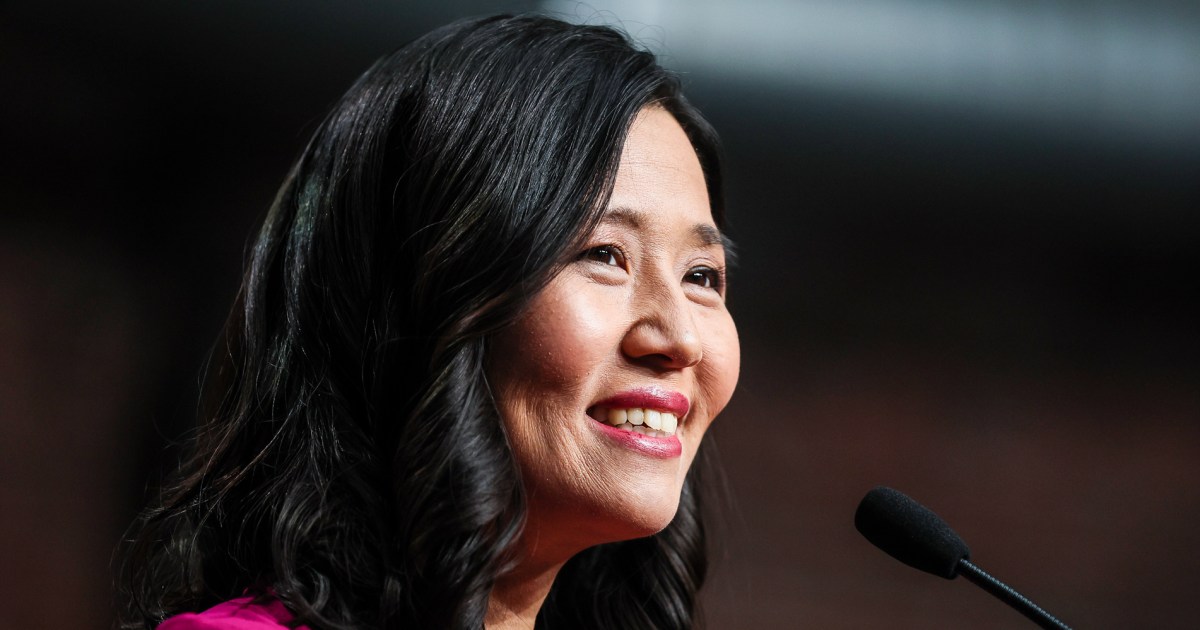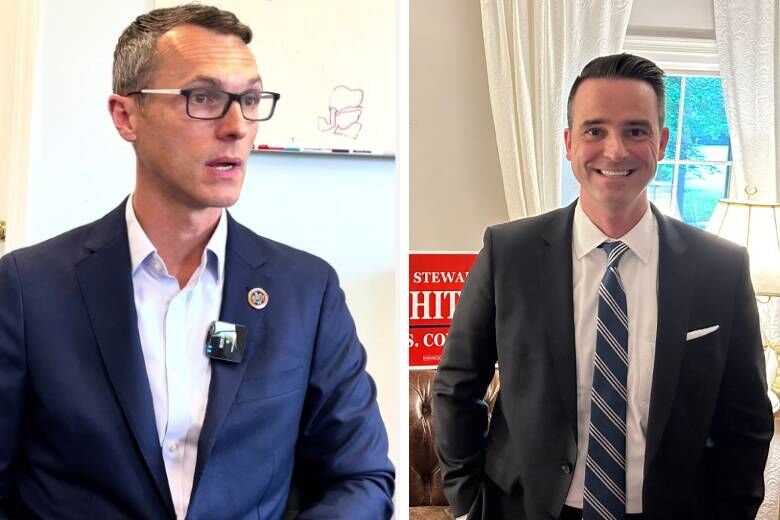Editor’s note: This story will be updated throughout Tuesday evening to include comments from the candidates and their supporters.
Boston Mayor Michelle Wu and challenger Josh Kraft will face off in a one-on-one general election in November after handily earning the top two places in Tuesday’s preliminary mayoral election.
Wu took first by a wide margin, earning 70% of the vote in her first reelection campaign, according to unofficial tallies updated around 11:30 p.m. Kraft, a longtime Boston nonprofit leader considered the mayor’s top challenger since he entered the race in February, followed with 25%.
The Associated Press called the race for Wu around 8:15 p.m., shortly after polls closed.
The mayor told supporters at a rally in Roslindale’s Adams Park Tuesday night that she had won by “a margin money can’t buy,” referring to her campaign’s frequent argument that her top opponent was leaning on family money, rather than experience or connection to the community, to win the race.
She said the heavy majority showed that Boston voters are against recent scrutiny from President Donald Trump’s administration of the city’s immigration policies.
“Make no mistake, the attacks we’ve seen aren’t just aimed at our campaign,” Wu said. “They’re aimed at our city, at affordable housing, at Boston Public Schools, at our colleges and universities, at union jobs and city workers. They are aimed at the very idea that Boston belongs to all of us, not just those with trust funds.”
results/assets/microsite/resizeClient.js”>
Public polling of the race had been limited, but the results largely mirrored a recent Emerson College survey showing Wu with a convincing lead heading into Tuesday.
The candidates, both Democrats, now have just under two months of campaigning until the Nov. 4 general election.
At an election night party in South Boston, Kraft rallied his side at a union headquarters and committed to redoubling his campaign efforts over the coming two months.
“Let me be clear — we are still in this race,” he told supporters at the Iron Workers Local 7 Union hall. “We know the road ahead is not going to be easy. But neither is life in Boston right now for too many families.”
Kraft’s supporters remained upbeat at the union hall as their candidate greeted them, undeterred by Wu’s hefty lead.
“We’re going to keep this race going, til the wheels fall off,” Anthony Seymour, a longtime friend of Kraft’s, said as he fired up the crowd ahead of the candidate’s arrival.
“This is what we’ve got to do to change and affect the way our city is going,” he’d told the crowd a few minutes earlier. “Things in Boston are really taking a deep dive for the worst reasons, and we’re here right now to take it up,” Seymour said.

Tuesday’s preliminary election eliminated two other candidates from competition: Domingos DaRosa, a community activist from Hyde Park, and Robert Cappucci, a retired Boston police officer and former School Committee member from East Boston, who each earned under 3%, according to initial results.
At Wu’s election night rally in Roslindale, the mood was festive.
A brass band played popular tunes and supporters joined in with handheld shakers.
Juan Felipe, a rideshare driver who is a member of the newly formed App Drivers Union, said he was there to support the mayor alongside fellow union members.
The App Drivers Union is a division of the larger union 32BJ SEIU, which endorsed Wu for reelection.
Though he said he was grateful for the mayor’s support of the union, more important was her personal connection to constituents.
“She’s doing a very good job. She’s walking through the communities all the time,” he said. “She has a presence.”
State Sen. Sal DiDomenico, D-Middlesex and Suffolk, told MassLive at the Wu rally that he has had a “long friendship” with the mayor and has supported her since her first City Council candidacy.
“Michelle Wu has honored her promises and delivered results for all neighborhoods of Boston,” DiDomenico said. “It should be a good night for her.”
State Rep. Rob Consalvo, D-14th Suffolk, told the crowd that he believes Wu is the best person to lead Boston as it faces pressure from the federal government, including a lawsuit filed last week by the Department of Justice over a city law that limits cooperation with the government on noncriminal immigration matters.
“Experience counts now more than ever,” Consalvo said. “This isn’t a time for someone who’s never held a job, who’s never lived in our neighborhoods, who hasn’t done the work. It’s time for a person who’s got the experience to fight on day one.”
Kraft supporters gathered in South Boston were equally critical of Wu.
“It’s been disappointing to see what she’s done, and what she hasn’t done,” Catherine Zhou, of West Roxbury, said as she waited for Kraft to arrive.
Zhou, a green card holder, cannot vote. But her partner, Andrew Stuckey, cast a ballot for Kraft. They cited Wu’s inability to solve the homelessness and public drug use crises at Mass and Cass as primary reasons for turning to Kraft.
At Mass and Cass, Stuckey said, Wu “had her shot at it.”
”Yes, there should be bike lanes, but to eliminate two driving lanes for one bike lane doesn’t make sense,” Zhou added. “It’s bottlenecking the traffic flow.”
Turnout on Tuesday was slender, with just 76,525 city voters casting their ballots as of about 6 p.m., according to the city’s Election Department.
By 9:20 p.m., turnout tallied at 17.9% of the city’s qualified voters, data showed. Wards 19 (Jamaica Plain and Roslindale) and 20 (West Roxbury) had the highest turnout, 28.7% and 28.4% respectively.
With a larger and more competitive field in the 2021 mayoral primary, voters cast nearly 109,000 ballots in the preliminary election.
Kraft, the former head of the Boys & Girls Clubs of Boston, moved to the city’s North End from Chestnut Hill in 2023 and registered to vote in Boston.
He kicked off his first campaign for public office by accusing Wu of ignoring the input of Boston’s residents and businesses.
His attacks since then have covered a wide variety of issues.
He has accused Wu of not doing enough to address Boston’s low housing stock and the lack of sufficient new construction that could lower real estate prices, and criticized her approach to public drug use that has spread from the troubled area of Massachusetts Avenue and Melnea Cass Boulevard — more commonly known as Mass and Cass — to other neighborhoods.
Kraft argues the city cannot afford the mounting costs of renovating White Stadium in Franklin Park into a new home for a women’s soccer team and an athletic field for city students. He has pledged to structurally reform the struggling Boston Public Schools.
Wu has consistently defended the White Stadium project against critics, saying it will expand opportunities for student athletes. She says the partnership with the professional team is the city’s only way to afford a new state-of-the-art stadium.
Kraft has also suggested a pause on the construction of new bus and bike lanes in order to study their impact and map out a cohesive plan for their development. The Wu administration has spearheaded the widespread addition of bike and bus lanes, which the mayor says improve street safety and traffic.
Kraft is the son of New England Patriots owner Robert Kraft, but turned to a career in nonprofit work rather than joining his father in managing the football team and the New England Revolution professional men’s soccer team.
In his first job out of college, Kraft worked as an outreach coordinator in South Boston, visiting at-risk young people to ensure they arrived at school in the morning.
He went on to work for more than three decades at the Boys & Girls Clubs of Boston, including 12 years as its president and CEO.
He also served as president of the New England Patriots Foundation, his family’s charitable organization. He sat on the board of the Urban League of Eastern Massachusetts, which he chaired, the board of Brigham and Women’s Hospital, and the state’s Hate Crimes Task Force, which he co-chairs.
Despite his long tenure working in Boston, Kraft’s semi-recent arrival as a resident of the city and his deep financial means have been frequent targets of the Wu campaign.
Kraft has poured $5.5 million of his own money into the effort. He made $6.3 million last year, which he said came from “the family business,” though he has declined to release his complete tax returns.
Even with the massive influx of cash, Kraft’s campaign has struggled.
The poll conducted last week by Emerson College showed Wu leading 72% to 22% among likely voters, a far more expansive lead than the 30-percentage-point margin with which she led when the Boston Globe and Suffolk University polled the race in July.
Addressing supporters Tuesday night alongside his partner Michelle Perez Vichot, his father, and his brother Jonathan, Josh Kraft brushed off last week’s Emerson poll, insisting that “the only poll that matters is in November.”
He said he would review the results on Wednesday with his campaign team and work from there.
Wu is wrapping up her first four-year term as mayor, but has been in city politics far longer than that.
She began working in city government in 2010 as an intern under then-Mayor Tom Menino and was first elected to the Boston City Council in 2013. From 2016 to 2018, Wu served as council president, becoming the first woman of color and Asian American to do so.
Wu has campaigned on her administration’s wins, such as investments in affordable housing and other programs to increase the city’s housing supply. The city registered its lowest homicide rate in decades last year, and while homicides have ticked back up this year, she has often referred to Boston as the “safest major city” in the United States.
The mayor also received a boost this year from her high-profile sparring with President Donald Trump’s administration, mostly on immigration issues.
In March, she testified before Congress in defense of Boston’s Trust Act, the city law that limits police cooperation with U.S. Immigration and Customs Enforcement on non-criminal immigration matters.
Since then, despite numerous threats from the federal government to withdraw funding from the city or send waves of ICE agents and National Guard troops into Boston, she has continued to fight back against the attacks from Trump.
MassLive Politics Editor John L. Micek contributed additional reporting.
If you purchase a product or register for an account through a link on our site, we may receive compensation. By using this site, you consent to our User Agreement and agree that your clicks, interactions, and personal information may be collected, recorded, and/or stored by us and social media and other third-party partners in accordance with our Privacy Policy.
Source link

